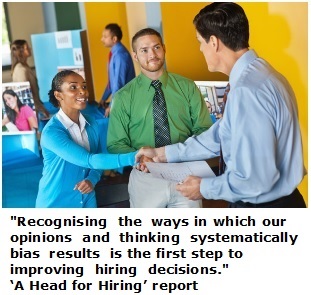 ReConnect Africa is a unique website and online magazine for the African professional in the Diaspora. Packed with
essential information about careers, business and jobs, ReConnect Africa keeps you connected to the best of Africa.
ReConnect Africa is a unique website and online magazine for the African professional in the Diaspora. Packed with
essential information about careers, business and jobs, ReConnect Africa keeps you connected to the best of Africa.



A revealing report highlights the impact of unconscious bias and how Diversity benefits are ignored as managers continue to hire in their own image.
 A revealing report highlights the impact of unconscious bias and how Diversity benefits are ignored as managers continue to hire in their own image
A revealing report highlights the impact of unconscious bias and how Diversity benefits are ignored as managers continue to hire in their own image Managers are still recruiting ‘mini-mes’ despite being aware of the hazards of unconscious bias, a CIPD study has revealed.
The report, A Head for Hiring: The Behavioural Science of Recruitment, found that bosses employ people with similar hobbies, experiences, dress sense and mannerisms as themselves, despite the fact that these qualities have no bearing on a candidate’s ability to do the job.
Recruiting and selecting the right people is fundamental to any organisation's success. How best to do it, however, remains a challenge. Behavioural science has a lot to say about the way in which people make decisions in these types of setting. This report, written for the CIPD by the Behavioural Insights Team, outlines ways in which harnessing knowledge about how we actually behave can help those engaged in recruitment to improve outcomes for organisations.
“It showed that both male and female managers favour men over women and candidates with ‘white-sounding’ names were called-back more often than those without, even when their CVs were identical.”
The report examines existing evidence through a behavioural science lens to offer examples from the literature and practical tips for recruiters. It explores ways to attract candidates best suited to the job and the organisation's broader needs; the use of key selection and assessment tools, and the biases and errors of judgement that may occur when using these tools; and the experience of the candidate during the recruitment process, including the impact of stress and the knock-on effects of the candidate experience on the employer brand.
“We all hear about unconscious bias in things like recruitment, but the fact is we’re not just biased – we’re super biased,” said Jonny Gifford, researcher advisor at the CIPD. “What this report shows is both how easily our decision making can be skewed and also in how many different ways it can be skewed.”
He added: “If you go too far down the road towards having cultural homogeneity, then you won’t be recruiting for difference. If you’re not recruiting for difference, then you’re going to have problems with diversity.”
Unconscious Bias – A Huge Problem for Recruiters
Unconscious bias remains a huge problem for recruiters, and the findings show that unconscious bias becomes more pronounced as fatigue sets in, with confirmation bias and ‘selective hearing’ creeping in as early as the fourth interview of the day.
“If you’re doing a number of interviews in a row, you start to make quicker judgements on whether you think people are in or out. So you’re taking in less information and you’re jumping to conclusions more,” said Gifford. “We mentally like to make life easy for ourselves.”
Further findings in the report will concern diversity campaigners. It showed that both male and female managers favour men over women and candidates with ‘white-sounding’ names were called-back more often than those without, even when their CVs were identical.
In a bid to help employers improve their hiring decisions, the CIPD has made a number of recommendations. These include anonymising CVs when reviewing them, spreading assessments and decisions across a longer time period and inviting people not involved in the assessing stages to assist with the final hiring decision.
The findings could affect thousands of young graduates and school leavers who are about to enter the job market and will face recruiters from a different generation. Gifford explained: “The potential for bias is a negative point for anyone who is coming from a different demographic group, whether you’re particularly older or particularly younger.”
Another report, the Social Mobility and Child Poverty Commission has criticised recruiters after its research revealed that 70 per cent of jobs for elite law, accountancy and financial services firms went to former students of selective state or fee-paying schools in 2014. The commission said that employers were biased towards ‘posh’ candidates.
This was despite the fact that the people responsible for recruitment at these firms were “generally aware of the dangers of recruiting in their own image and nearly all had been trained in unconscious bias”.
Meanwhile, a 2015 report by Business in the Community (BITC) found that unconscious bias from recruiters was hampering the job prospects of men from black, Asian and minority ethnic backgrounds.
Sandra Kerr OBE, race equality director at BITC, said: “We know that everyone has different biases which may be linked to different diversity characteristics. However, the challenge is about understanding individual biases, being aware how it could impact decision making – particularly in relation to recruitment and progression - and taking steps to reduce it."
Source: CIPD
